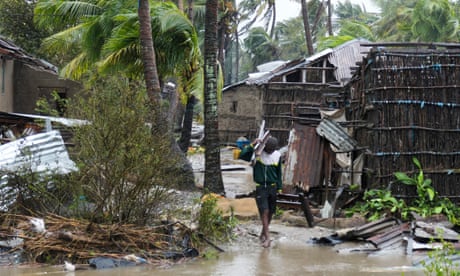- by foxnews
- 03 Feb 2025
More than 100 killed as Storm Freddy returns to Mozambique and Malawi
More than 100 killed as Storm Freddy returns to Mozambique and Malawi
- by theguardian
- 14 Mar 2023
- in news

Mozambique and Malawi have been left counting the cost of Tropical Storm Freddy, which killed more than 100 people, injured scores and left a trail of destruction as it ripped through southern Africa for the second time in a month over the weekend.
Freddy is one of the strongest storms ever recorded in the southern hemisphere and could be the longest-lasting tropical cyclone, according to the World Meteorological Organization.
It pummelled central Mozambique on Saturday, ripping roofs off buildings and bringing widespread flooding around the port of Quelimane, before moving inland towards Malawi with torrential rains that caused landslides.
The full extent of the damage and loss of life in Mozambique in particular is not yet clear, as the power supply and phone signals were cut off in some parts of the affected area.
The storm has killed 99 people in Malawi, including 85 in the main commercial hub of Blantyre, said the commissioner of the Department of Disaster Management Affairs, Charles Kalemba, on Monday.
The total number killed by storm Freddy in Mozambique, Malawi and Madagascar since it first made landfall last month is now about 136.
The central hospital in Blantyre had received at least 60 bodies by early afternoon, Doctors Without Borders (MSF) country director Marion Pechayre told Reuters by telephone, adding that about 200 injured were being treated in the hospital.
Guy Taylor, chief of advocacy, communications and partnerships for Unicef in Mozambique, told Reuters from Quelimane that humanitarian agencies there did not have the capacity to deal with a disaster of this size.
The wind had died down on Monday but there was still a lot of flooding that had destroyed crops and created a risk of waterborne diseases, he said.
Malawi has been battling the deadliest cholera outbreak in its history, and UN agencies have warned the situation could now get worse.
Scientists say fossil fuel-driven climate change is making tropical storms stronger, as oceans absorb heat from greenhouse gas emissions and when warm seawater evaporates heat energy is transferred to the atmosphere.
- by foxnews
- descember 09, 2016
Super Bowl 2025 flights, hotels see major price hike ahead of big game
Super Bowl LIX appears to be affecting flight costs and hotel accommodations as Kansas City Chiefs and Philadelphia Eagles fans head to New Orleans, Louisiana, for big game.
read more


